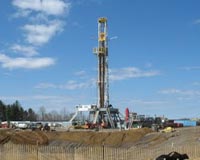The controversial process of exploiting shale gas through fracking today moved into focus at the Planning Court.
In one of the first cases of its kind to proceed to a full hearing, residents of a West Sussex village are attacking the county council’s decision to approve so-called unconventional oil exploration at Lower Stumble, near Balcombe.
While unlikely to create a precedent for fracking cases across the country, the hearing will be watched with interest by an industry that is struggling to get a foothold in the UK, according to Claire Dutch, a partner with Hogan Lovells’ planning team.
“I think everybody will be interested in this case, because the fledgling shale gas industry is struggling to get off the ground in the UK,” she said. “Two of the main barriers are land ownership and the planning process. The government is trying to sort out the land ownership issue – it published a consultation paper in the summer that proposes that operators are given statutory rights to drill under people’s land at a depth greater than 300 metres, which clearly shows that the government is trying its best to address the issues that the embryonic shale gas industry needs addressing in order to take off in this country and hopefully help address the energy crisis.
“But on the planning side it is very difficult, because it attracts almost disproportionate public opposition.”
This, she said, is surprising because the visible element of such development is “reasonably discreet”, while the environmental impacts of exploration are “not any greater than other major energy developments” and the actual production stage is still several years down the line. But she added that planning decisions should be taken on planning policy grounds, and that that how many people object to an application is “not really a material consideration”.
She added: “It will be really interesting to see the outcome of this case. I don’t think that any precedent on the acceptability of fracking can be taken from it, as every case will be site specific. The courts cannot say ‘we’re saying no to fracking’.
“If this decision is quashed, I don’t think we can automatically say that fracking will never take off, but it would clearly be another blow to the shale gas industry. It may well be that operators throw in the towel and say it is too difficult on this small, densely populated island to go ahead with fracking.”
The Frack Free Balcombe Residents Association is hoping to persuade Gilbart J to quash the planning permission granted in May to Cuadrilla to operate a 14-metre testing flare at an already-drilled hydrocarbon lateral borehole on the site.
David Wolfe QC, representing the campaign group, told the judge this was “not a ‘NIMBY’ complaint”. He said: “FFBRA’s members would rather that such onshore unconventional oil or gas exploration did not take place here or anywhere.”
But he argued that the group is anxious to ensure as a general proposition that, where fracking is to take place despite strong opposition, the decisions relating to it should be properly taken, with proper consideration given to the environmental and other risks involved, and the wider interests of local people.
In this case, he argued that the planning committee granted planning permission for a temporary six month period without sufficient information on how the impacts of the process are to be monitored and controlled during that period.
The Queen on the application of Frack Free Balcombe Residents Association v West Sussex County Council Planning Court (Gilbart J) 6 November 2014










